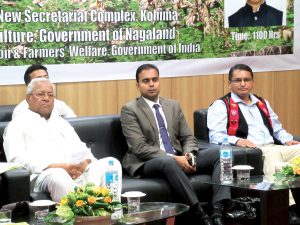Nagaland
Efforts on to get GI tag for Mokokchung’s ‘sweet cucumber’

Our Correspondent
Kohima, Sep. 24 (EMN): Following the Geographical Indication (GI) registration being received for the Naga pepper and Naga tree tomato under ‘agricultural products’ of the Geographical Indications of Goods (Registration & Protection) Act of 1999, process is underway for GI registration of “sweet cucumber,” from Mokokchung district.
The Naga morich, or “king chilli,” was the first to receive the GI tag during April 2008-March 2009 followed by the Naga tree tomato receiving the tag during April 2014-March 2015. Soon, the ‘sweet cucumber,’ which is claimed to be a cucumber species not found in any other place, may be granted the GI registration.
The Horticulture department of Nagaland is said to have processed ‘organic certification’ and was hopeful that by next year some of the produce from Nagaland would be certified; it is intending to propose more produce for organic certification.
This was informed by MK Mero, principal secretary for Horticulture during a programme that was held at the Capital Convention Centre at the new Secretariat on Sep. 24.
The programme organised by the department of Horticulture was held under the patronage of Nagaland Governor PB Acharya and sponsored by the ministry of Agriculture, Cooperation and Farmers Welfare.
Though Nagaland is a small state, Mero said, it is rich in flora and fauna and has plenty of indigenous fruits and vegetables that are unique and are not found in any other states, or even countries.
Over the years, though many of the agriculture produce have become marketable, lack of a proper wholesale market in the state at the moment is a big setback for the farmers though, said Mero. The officer observed that transportation of goods from hilly areas was another problem that requires a solution.
While being aware of the logistics issues faced by the farmers for transportation and marketing of goods, he said the department is pushing for ‘domestic cargo clearance facility’ and ‘custom clearance facility’ and that it is making efforts to facilitate the farmers by creating a big wholesale market for agriculture producers.
Mero also pointed out that though there are several schemes under NBH, the state could not avail much of the scheme and that over the last one decade, it could avail only INR 1 cr while states like Maharashtra is availing INR 100 crore a year.
He also cited the problems of farers in getting loan from financial institutions as the lands are not transferable and cannot be used as a collateral security for obtaining financial loans.
Governor Acharya who is en-route to Guwahati in a brief interaction with the farmers maintained that Nagaland being blessed with favourable climatic condition and rich natural resources, the people has to utilise and bank on it for a sustainable livelihood.
Stating that self-sufficiency of food is most crucial for any society, he asserted that farmers must be empowered and strengthen, who are the backbone of the society. Towards this end, he emphasized that a situation must be created and that there has to be a dialogue on what the state needs be it agriculture, industry, education etc.
The most important component for any to society to progress, according to him are the ‘3Es’ – ‘education, electricity and empowerment’ and reiterated that the society today needs skilled people and not administrative knowledge, which the state has enough of it.
“We are no more tribals in any sense of the term” stated Acharya and called for a change of mindset, be a true Christian and be responsible for our actions. He also asserted that every individual has a duty to make Nagaland a ‘golden state’, however, reminded that unless the people work hard with the right approach, Nagaland, he said, will never progress.
Atul R Patwardhan, of the Chindamani Consultancy & Services at Pune in Maharashtra, was a special invitee during the interaction. Patwardhan highlighted various schemes and projects of the National Horticulture Board, Mission for Integrated Development of Horticulture (MIDH). He said that the MIDH was a centrally sponsored scheme for the growth of the horticulture sector covering fruits, vegetables, root and tuber, mushroom, spices, flowers, aromatic plants; and coconut, cashew, cocoa and bamboo.
He explained in detailed the various sub-schemes and projects viz. projects under controlled environment, post harvest management projects etc and the cost norms that are applicable to farmers and the eligible criteria.

